Yves here. Helmer’s deep dives into Ukraine’s corruption are a cross between Graham Greene underworldliness with a contemporary veneer of financial wheeling and dealing, plus lots of think tank laundered influence peddling. For those not up on the dramatis personae in Ukraine, Igor (also spelled Ihor) Kolomoisky is one of the wealthiest men in Ukraine.
By John Helmer, the longest continuously serving foreign correspondent in Russia, and the only western journalist to direct his own bureau independent of single national or commercial ties. Helmer has also been a professor of political science, and an advisor to government heads in Greece, the United States, and Asia. He is the first and only member of a US presidential administration (Jimmy Carter) to establish himself in Russia. Originally published at Dances with Bears
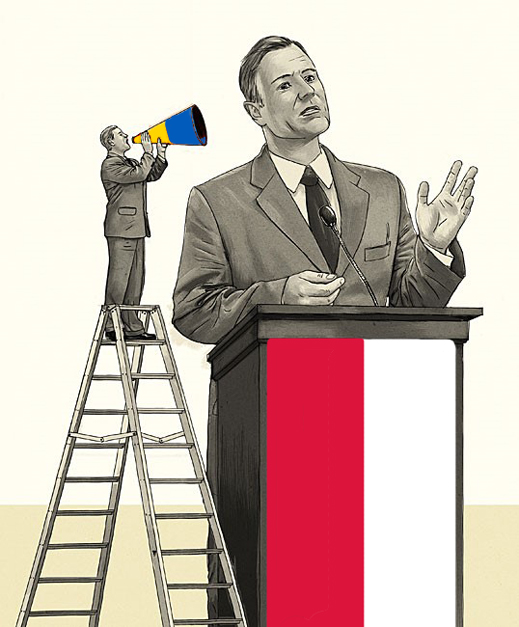
Polish figures and former officials who have been leading the campaign for Polish financial and military aid to the Ukrainian Government in Kiev may have been lobbyists for Igor Kolomoisky’s PrivatBank, when he was trying to obtain a Polish banking licence.
Documents sent and received by PrivatBank, just published in Warsaw, reveal that Kolomoisky’s bank engaged a law firm in Warsaw to direct the lobbying campaign. The documents claim the campaign involved Polish academic and finance official, Marek Dabrowski, in an attempt to lobby his friend, Leszek Balcerowicz, when Balcerowicz was President of the National Bank of Poland (NBP). According to sources with direct knowledge of what happened, when the Polish secret services recommended against licensing Kolomoisky’s bank, Dabrowski and Balcerowicz were invited to endorse an indirect plan for Kolomoisky to acquire control of Bud-Bank (Bank Budownictwa Mieszkaniowego), a small, state-owned Polish institution which was already licenced.
The documents released to date suggest that current links between the Polish names and current members of the Ukrainian war party may have started as business links between them a decade ago. Dabrowski categorically denies involvement in, or knowledge of the licence process or of the lobbying campaign. The documents substantiate no wrongdoing by the Poles or Ukrainians engaged in PrivatBank’s bid, which ultimately failed to win Polish approval.
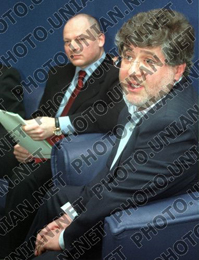 The Polish law firm was Soltysinski Kawecki & Szlezak (SKS). The PrivatBank executives instructing the lawyers were Natalya Armashova and Andrey Masko; they reported to Olexandr Dubilet, then chief executive and currently board chairman of PrivatBank. Picture at right shows Dubilet with Kolomoisky in April 2003. Emails of their communications during the licence lobbying campaign have been released in recent days. They date from 2004 and 2005.
The Polish law firm was Soltysinski Kawecki & Szlezak (SKS). The PrivatBank executives instructing the lawyers were Natalya Armashova and Andrey Masko; they reported to Olexandr Dubilet, then chief executive and currently board chairman of PrivatBank. Picture at right shows Dubilet with Kolomoisky in April 2003. Emails of their communications during the licence lobbying campaign have been released in recent days. They date from 2004 and 2005.
One of the documents authored by Masko of PrivatBank, directed to the lawyers in Warsaw, says: “PrivatBank have a good relations with prof. Marek Dabrowski. He is good friend and companion-in-arms of Leszek Balcerowicz (he was his First Deputy when Balcerowicz was Ministry of Finance). He was Supervisory Board Member of NBP for a long period. Tomorrow Mr. Dabrowski will meet Mr. Balcerowicz for business purposes and can discuss with him something regarding PrivatBank. Please advise what issues regarding PrivatBank can be discussed on the meeting and what can we ask from Mr. Balcerowicz. Please give your proposals before noon today.” The authenticity of the email has been checked and confirmed by the recipients.
Masko is no longer contactable at Privatbank. Armashova has moved to an investment firm in Cyprus connected to the Privat group. At group headquarters in Ukraine, Dubilet refused to respond to requests to confirm his subordinates’ record of the Polish bank licence campaign. Dubilet said through a spokesman:: “About work in Poland, a few years ago, we have studied the possibility of opening a branch in Poland, as well as other EU countries, where there are a lot of workers or tourists from Ukraine. Today our bank is operating in Latvia, Portugal, Italy. We have decided not to receive a license in Poland not because of ‘special services’, but because of the high overhead costs in managing the bank in Poland and the highly competitive market.”
According to a source involved in the campaign, elected Polish officials and politicians were sympathetic to Kolomoisky and supportive of Privat’s attempt to break into the Polish market. “Bud-Bank was a shell with a licence. The political climate [for approval] was good.” The source says that to qualify for a licence, the Ukrainians had to meet regulations requiring Polish management of licenced banks, and their independence from the control shareholders.
An email received at PrivatBank from the lawyers in Warsaw advised against the plan for PrivatBank to take over Bud-Bank through a third entity off PrivatBank’s balance-sheet. “This sort of structure is unlikely to be acceptable to the National Bank of Poland and creates a substantial risk of permit refusal: (1) This type of arrangement creates a risk of lack of transparency that may be prejudicial to the effective exercise of regulatory powers by the Polish bank supervision authorities (a basis for refusal of the permit — art. 25.5 Banking Law). In addition, it is highly uncommon on the Polish banking market. (2) Under the contemplated transaction structure, the funds applied to the purchase of Bud-Bank would not be PrivatBank’s own funds, which is also a basis for refusal of the relevant permit (art. 25.5 Banking Law).”
Corroboration of the Bud-Bank move came from PrivatBank itself in this statement to the Kyiv Post on February 5, 2005: “The Privatbank group plans to build the bank into a competitive universal banking institution in Poland.”
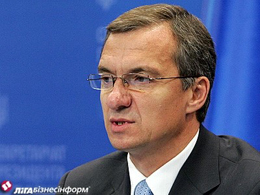 To persuade Polish central bank staff that he didn’t interfere in the management of his banks, Kolomoisky reportedly flew Alexander Shlapak (right) from Kiev to Warsaw in his private jet to provide a testimonial, according to a Polish source. At the time, Shlapak was Vice Governor of the National Bank of Ukraine (NBU). Shlapak had been a high-ranking employee of PrivatBank in the 1990s, before he was named to positions in thegovernments of Victor Yushchenko and Yulia Tymoshenko.
To persuade Polish central bank staff that he didn’t interfere in the management of his banks, Kolomoisky reportedly flew Alexander Shlapak (right) from Kiev to Warsaw in his private jet to provide a testimonial, according to a Polish source. At the time, Shlapak was Vice Governor of the National Bank of Ukraine (NBU). Shlapak had been a high-ranking employee of PrivatBank in the 1990s, before he was named to positions in thegovernments of Victor Yushchenko and Yulia Tymoshenko.
Shlapak’s flight to Warsaw was unconvincing; the Polish lawyers told the Privat executives it was a “faux-pas”. One of the emails to have leaked says: “The NBP [Warsaw] licence evaluation team is very sensitive to all facts related to the supervisory independence of the NBU [Kiev]. PB has to accelerate its local work in Warsaw with [names of Polish management candidates for Bud-Bank]. No sense to lobby at higher levels if the CEO papers are not in place and the business plan is not satisfactory to NBP.”
Kolomoisky’s plan to acquire 75% of Bud-Bank was disapproved in 2005; the bank was then allowed to be taken over and operated by Dexia of Belgium. “The negative opinion of the Polish secret services voided all the lobbying schemes, backdoor and frontdoor”, concludes one of the Polish participants. The relationship between Aleksander Kwaśniewski (below, right) , the Polish president at the time, and the Ukrainian president, Victor Yushchenko (left), remained close and supportive.

Last year, Shlapak was the selection of the new regime in Kiev to be Ukraine’s finance minister until he was replaced last December by the US Government nominee, Natalie Jaresko. For more on Shlapak, read this. For more on Jaresko, start here.
In the Ukrainian civil war Balcerowicz (below, left, with President Petro Poroshenko in January) and Dabrowski (below, right) have publicly positioned themselves on the side of the war party, proffering financial and budget advice to government agencies and officials in Kiev. These have included the Ukrainian Finance Ministry under Shlapak.
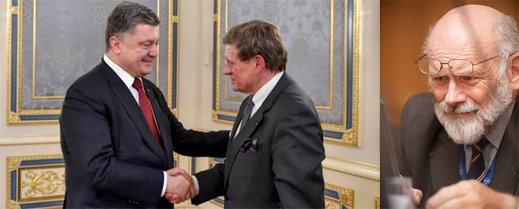 reported last week.
reported last week.
Dabrowski has responded: “I want to warn you that there may be a legal consequences for journalistic libel. This publication, which has already been published, is highly defamatory of different people. It’s a shame. Once in my life I have met with such publishing, but only deep in the communist era. These publications were in the Soviet Union, Poland, and other countries. I may be naive to think that this is a thing of the past, but it turns out that there is a reincarnation in Western journalism… I am not going to take part in it, and seriously warn that there are legal consequences for this type of publication. Regardless of whether they were printed in Russia or the United States or somewhere else, certain standards must be observed.”
“Since 2011, I have not had many activities with CASE , but still I continue to work with the organization. All that was written about CASE is full[-blown] delirium. More about CASE Ukraine — it is a small organization, it has never been related to policy. I’m sorry for these [CASE] guys in Kiev, these young guys—why do these young guys have to stand [for criticism] as it’s not clear what [they are accused of being]– Russia’s enemies? enemies of what? Spies?… This is an outrage….why these guys are bullied I do not understand. You must be careful pushing accusations against people and organizations. You should be more careful. It’s all a disgrace. I do not exclude that it may end in some kind of legal consequences if this activity does not stop.”
In his public curricula vitae Dabrowski acknowledges that during 2013 he was paid to advise the International Monetary Fund (IMF) as the team leader of the IMF’s “Independent Evaluation Office” reviewing IMF programmes in Central Europe between 2008 and 2011. In 2013 he was also sponsored by the Bank of Finland to do research on monetary policy performance in Ukraine and other CIS economies. In 2014 Dabrowski says he was paid by the European Commission for research. He is emphatic that he remains an independent researcher, and has not taken sides in the Ukraine civil war, or the war for regime change in Russia.
“I am not involved in policy advocacy or policy advising in Russia (since 1994). Nor I am [any] longer personally involved in policy advising in Ukraine (since 2006). In CASE Ukraine I chair the Supervisory Board on behalf of the founder (CASE [Poland])… The entire CASE network, including CASE Ukraine, deals with economic research agenda and is not involved in politics of any country… Furthermore, CASE [Poland] and CASE Ukraine do not present institutional opinions on any topic.”
According to a Bloomberg report of last October, Dabrowski claimed that “the patriotic zeal that’s grown during the war in Donbas may offer a limited window for change. Past experience tends to illustrate that such a window of opportunity is usually short-lived. Revolutionary mobilization doesn’t last long. People who don’t see visible positive changes become disappointed, and enthusiasm is replaced by apathy and impatience.” Dabrowski was referring to the Kiev side. In other publications at the same time, Dabrowski endorsed budget spending cuts, austerity measures, and the conditions of IMF stand-by arrangements in Greece and Ukraine.
On Ukrainian BTB television, on October 15, Dabrowski advocated positions in favour of the Kiev government, including a recommendation to halt Russian gas supplies to Ukraine. BTB (“Bank Television”) is controlled by the National Bank of Ukraine.

Source: https://www.youtube.com/watch?v=D2SZDwGb2U0
This week Dabrowski was asked to clarify his relationship with PrivatBank during the time he was serving himself on the Monetary Policy Council of the National Bank of Poland; the role he may have played to convey to Balcerowicz and the NBP the PrivatBank application for a Polish banking licence; and the relationship he may have had at the time with Igor Kolomoisky.
Dabrowski replied: “I will not answer your questions. And if you try to prove that I was doing some business with Mr. Kolomoisky, that makes no sense. You have to understand that it’s fantastic. I have never met this man in my life. I am not engaged in his business. I do not even know what is his business. I know he is an oligarch, but as a scientist I never dealt with the oligarchs. Privat Bank – the one thing I know is that there is [such] a bank in Ukraine with some offices. It’s quite a big bank. That’s all I know about them. I do not even know that they were trying to get a license abroad. Whether it was received or not received, that was never my interest.”
Balcerowicz was asked through spokesman Natalia Wykrota to clarify his relationship with Dabrowski at the time of the PrivatBank licence application; what action he had taken towards the licence; what relationship he has had with Kolomoisky; and what he knows of the relationship between Dabrowski and PrivatBank alleged in the Warsaw documents. Wykrota, who works at Balcerowicz’s Forum Obywatelskiego Rozwoju (FOR, Forum for Civic Development) group in Warsaw, said she hasn’t heard of Dabrowski.
Balcerowicz refused to answer the questions.
Sources in Warsaw said this week they believe that between 2011 and 2013 Kolomoisky made another attempt to break into the Polish market. This time it was with a bid for the Polish air carrier market with a plan to merge Kolomoisky’s weak Ukrainian airlines, AeroSvit and Dniproavia,
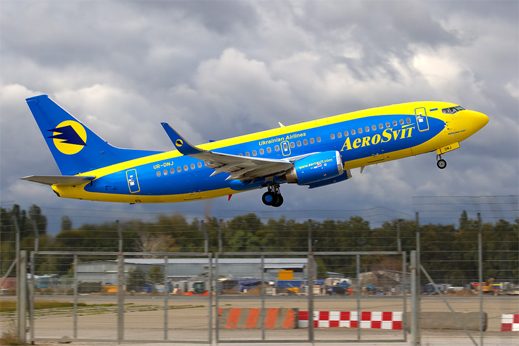
with the state-owned and unprivatized Polish carrier LOT, together with the small airlines Cimber Sterling of Denmark, Skyways Express and City Airline of Sweden, which Kolomoisky acquired through a Cyprus firm, Mansvell Enterprises.
The plan has failed to materialize. By the time the Polish Government was ready to privatize LOT in 2013, all five Kolomoisky-controlled airlines were bankrupt.


“Everywhere the U.S. goes turns into Iraq or Libya.” – Vladimir Putin
“The U.S. is the one indispensable nation.” – Barack Obama.
Just wanted to post this in case anyone has not seen these, regarding Ukraine in general.
Thank you for referring to what’s happening in Ukraine as a civil war. Almost no one, even my favorite journos, seems to call it that. You almost never hear the phrase “Ukrainian civil war,” but you always hear “Russian-backed separatists”…even from Amy Goodman {sigh}. The latter phrasing, of course, makes it sound like Russia instigated all of this, rather than a coup.
I with the Saker – it’s “U.S. controlled Nazis” in Kiev versus “Ukrainian Federalists” in the east.
The Saker rocks!
It would be unseemly to refer to the reigning government as the “occupation regime” or the “post-coup rulers”, I suppose. One would need to use such language to justify calling the other side in the conflict, “Freedom Fighters” and/or “the resistance.” While probably true, it simply won’t do.
western-backed junta vs anti-maidan rebels.
Pro-Russian separatists is what I hear most often in the mainstream media, and it seems to be an accurate term: they are separatists who want to create a breakaway republic(s) that will be absorbed into the Russian federation.
How about “anti-fascist independence activists”?
some do. others want an independent donetsk republic. but they all want nothing to do with the kiev coup which overthrew their president.
I keep finding myself thinking that we are back at “the great game”, with closet fascists as the players.
In essence, this is a big messy cockfight…
He supports several of the atrocity committing “punitive battalions” in Ukraine’s civil war and is, in general, a scumbag.
From wikipedia:
In April 2014 Kolomoyskyi offered a bounty for the capture of Russian-backed militants and incentives for the turning in of weapons.[32] He also is believed to have spent $10 million to create the Dnipro Battalion,[31][33] and also funds the Aidar, Azov, Dnepr 1, Dnepr 2, and Donbas volunteer battalions.[34] Members of the Aidar Battalion “have been involved in widespread abuses, including abductions, unlawful detention, ill-treatment, theft, extortion, and possible executions,” according to Amnesty International, while the Azov Battalion was seen flying flags carrying symbols of a Ukraine neo-Nazi party, Patriot of Ukraine.[35]
How does fascism survive the generations? Like it was never vanquished. It must be as primal as survival – like every other troublesome thing. Why did the German Nazis and Stalin’s Russia both (both) agree to crush Poland? Why did England rush in to support Poland with a contingent declaration of war written up months before? Why did the end of WW2 bring us the total repression of eastern Europe? And why is this primal carnivore back on the prowl? It is more than just a useful idiot. It is also a very reliable one.
1. I don’t think the Soviets had any illusions about the Nazis and were still industrializing. Look at how antsy Americans were about 9/11 and Pearl Harbor. The Nazis managed to get quite a bit closer.
2. The English mucked up in Munich and operated under the assumption Hitler wanted to absorb ethnic German areas. When he grabbed the rest of Czechloslavakia, the British and the French responded with a threat of war over Poland.
3. Total repression? The Nazis found some willing populations, and Poland had it much worse than the other eastern bloc states despite their constant whining. Do you think America and Western Europe were really going to take responsibility? No. Churchill didn’t want the Soviets mucking around in the colonies, so he gave them Europe which also gave the USSR the buffer zone they wanted having been invaded 3 times in the previous 30 years. Yes, three time.
Please cite the three times the Soviet Union was invaded between 1909 and 1939 ( or did you mean 1915-1945?), and by which nation(s).
I’m sure he meant Russia, not the Soviet Union. And I’m sure he meant twice, not three times–unless he’s counting the expeditionary forces sent by the west to fight alongside the white army (1918-22).
really grotty the boyz cuttin their deals
should we somewhat survive the intersect between the city on the hill and less elevated precincts. I guess it all depends on what the sea level equilibrium will be following global warming.
If Helmer knew as much about Ukraine and Marxism as he claims to know about neo liberal capitalism he would stop being such a hypocrite and apply the same standards to Ukraine’s anti imperialist struggle against Russian colonialism as he does to various anti- US imperialist struggles.
Yes Mr Helmer, Ukraine had no bourgeois revolution in 1848. That revolution failed in 1917 and nothing happened in 1989-91 either. It did happen in 2014. Now we have a Ukrainian national bourgeois capitalist oligarch class that has kicked out the comprador Russophile/ Russian oligarch class . One of its agents Kolomoisky is interacting with Polish and EU capitalists. Wow! That is really something! Give us all a break and tell us something we don’t know.
Like how Greek and Portuguese workers are all flocking to Moscow to live and work under neo soviet Putin style neo liberal capitalism. Or why you live where you do and obviously not in Moscow. Or how about Ukrainian workers who dream Ukraine could be like Greece or Portugal or Poland where they all have to go to work.